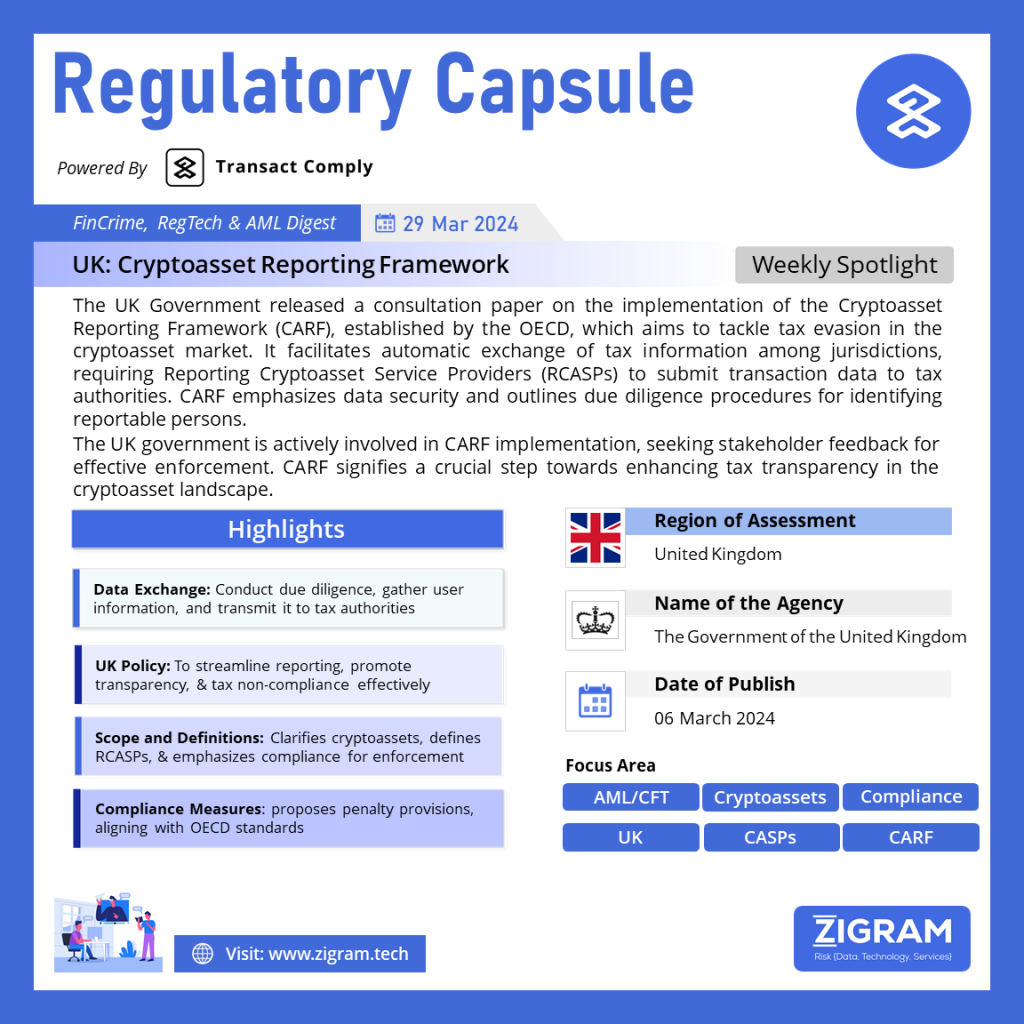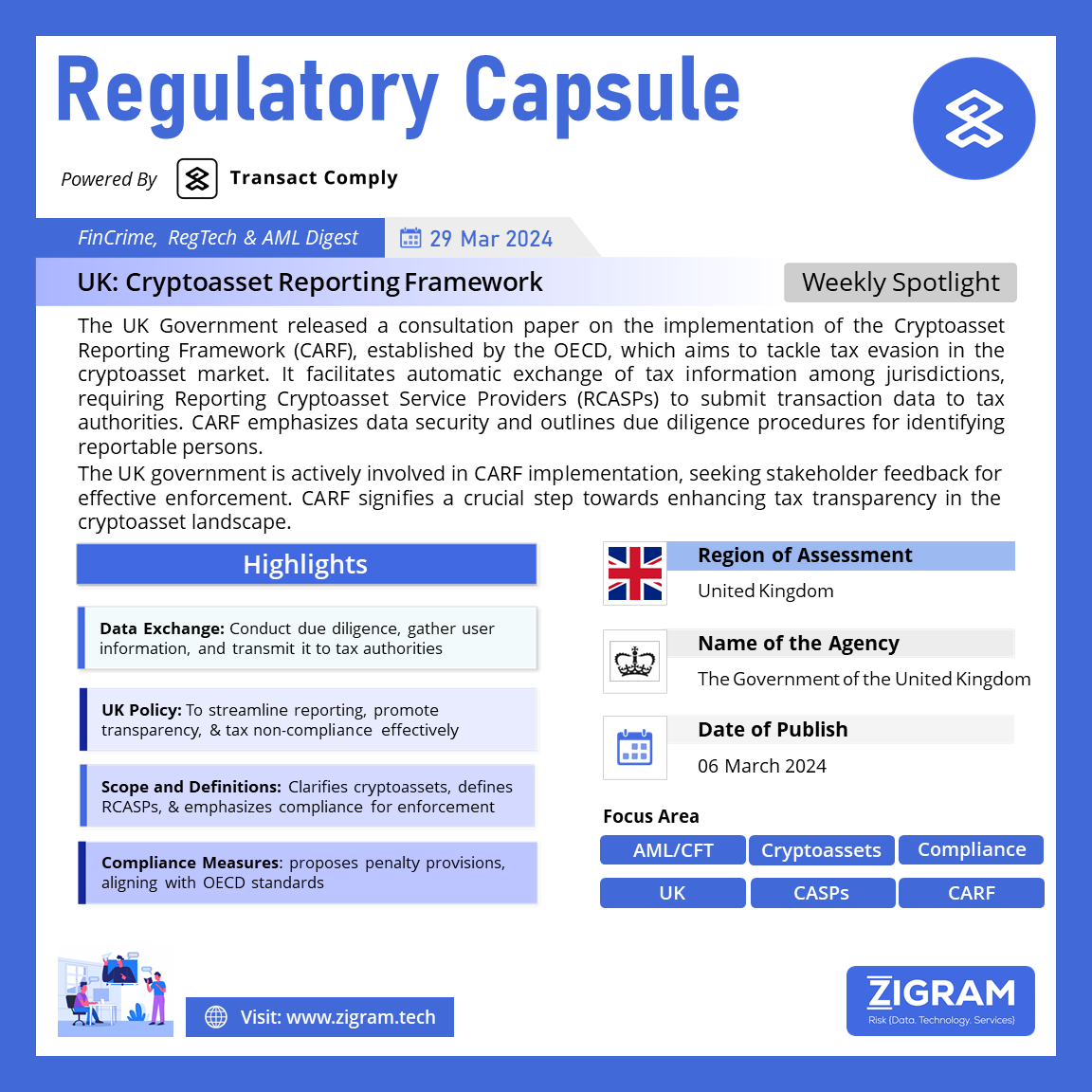Published Date:
Regulation Name: Cryptoasset Regulatory Framework in the UK
Publishing Date: 03 March 2024
Region: United Kingdom
Agency: Government of UK
In the digital age, the rise of cryptoassets has revolutionized financial transactions, offering unprecedented anonymity and decentralization. However, this surge has posed significant challenges to tax authorities worldwide, fueling concerns about tax evasion, avoidance, and non-compliance. In response, the Organisation for Economic Co-operation and Development (OECD) has developed the Cryptoasset Reporting Framework (CARF), a pioneering initiative aimed at enhancing tax transparency in the cryptoasset market.
Understanding the CARF
The CARF represents a groundbreaking step in tax transparency, facilitating the automatic exchange of tax-relevant information on cryptoasset transactions among participating jurisdictions. Unlike traditional financial assets, cryptoassets operate outside the purview of conventional banking systems, making them elusive to tax authorities. The CARF addresses this issue by mandating Reporting Cryptoasset Service Providers (RCASPs) to collect and report comprehensive data on cryptoasset users and transactions to tax authorities.
Mechanisms of the CARF
Under the CARF, RCASPs are obligated to conduct due diligence on cryptoasset users, gather pertinent information, and transmit it to tax authorities. This data exchange mechanism enables tax authorities to identify instances of tax non-compliance and enforce compliance with the framework. Importantly, the CARF prioritizes data security, ensuring that information exchanges adhere to stringent confidentiality and data safeguard protocols.
Policy Objectives of the UK in Implementing the CARF
The UK government is committed to leveraging the CARF to combat tax non-compliance effectively. By implementing standardized reporting rules, the UK aims to streamline reporting procedures, promote tax transparency, and foster the sustainable growth of the cryptoasset sector. The consultation process seeks to solicit feedback on optional elements of the CARF implementation, emphasizing stakeholder engagement and transparency.
Scope and Definitions
The CARF delineates the scope of cryptoassets covered, including relevant definitions for Reporting Cryptoasset Service Providers (RCASPs) and reportable users. It outlines due diligence procedures for identifying reportable persons and underscores the importance of compliance and enforcement measures to ensure the efficacy of the framework.
Compliance and Enforcement
To uphold the integrity of the CARF, robust compliance and enforcement mechanisms are imperative. The UK government proposes penalty provisions for instances of non-compliance by RCASPs and reportable users, aligning with OECD standards. These penalties encompass a range of infractions, from late submissions to inaccurate reporting, underscoring the government’s commitment to enforcing compliance with the CARF.
Stakeholder Engagement and Next Steps
The consultation process invites input from a diverse array of stakeholders, including individuals, businesses, academics, and non-governmental organizations. By fostering an inclusive dialogue, the government seeks to refine the implementation of the CARF and address any concerns or suggestions raised by stakeholders. Furthermore, the government pledges transparency throughout the process, with plans to publish a summary of responses and provide draft regulations for further scrutiny.
As the cryptoasset market continues to evolve, the implementation of the Cryptoasset Reporting Framework represents a pivotal step in enhancing tax transparency and combatting tax evasion. By embracing standardized reporting mechanisms and robust enforcement measures, the UK government aims to create a more equitable and accountable financial ecosystem. Through collaborative efforts and stakeholder engagement, the CARF heralds a new era of transparency and integrity in the cryptoasset landscape.
- #CryptoassetRegulation
- #RegulatoryFramework
- #DigitalAssets
- #FinancialCompliance
- #BlockchainRegulation
- #TaxTransparency
- #DataSecurity
- #FinancialRegulation
- #ComplianceStandards
- #GlobalTaxFramework
- #UK
- #CARF


